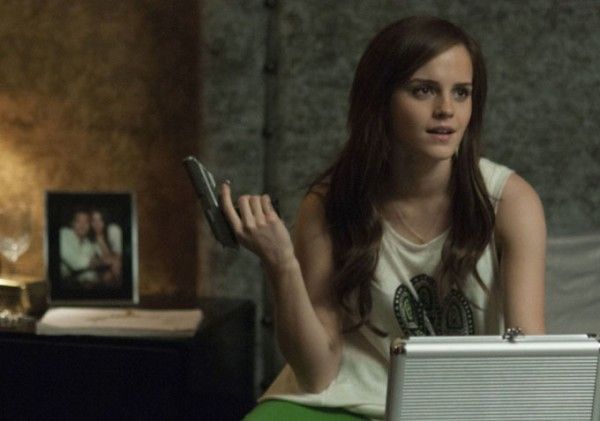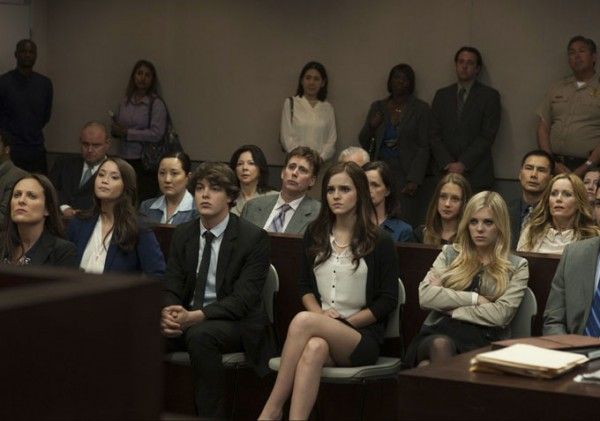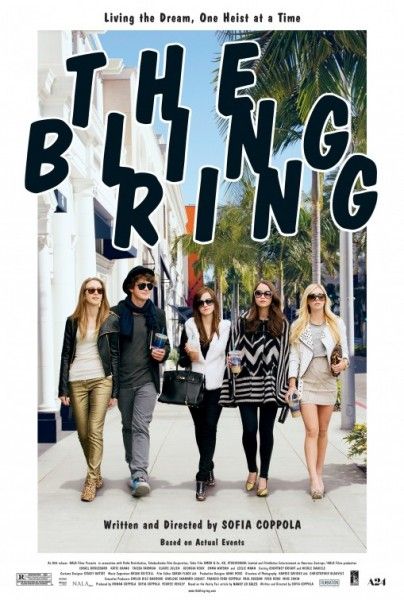When I'm in line at the supermarket, I see the covers of celebrity magazines, and I wonder, "Who buys this stuff? What compels them to be so interested in the lives of strangers?" We have an artificial familiarity with celebrities based on the entertainment we consume. Today, "celebrity" has even become a profession whereas it used to be you had to have some kind of tangible skill usually relating to public performance before you were constantly in the public eye. Even though celebrity worship has become engrained in our society arguably since Clara Bow became "The It Girl", media saturation has brought us to critical mass. Despite the fascinating origins of this obsession, Sofia Coppola's The Bling Ring skips over the interesting, unexplored aspects, and heads straight to pedestrian observations of celebrity fixation. While it's certainly spot-on and is peppered with humorous moments, audiences can gleam the same observations from a plot synopsis. Moreover, Coppola's criticisms fall flat when the existence of her film plays into the celebrity culture she aims to critique.
Based on true events from 2008-2009, The Bling Ring centers on a group of upper-middle-class teenagers in Calabasas, California who robbed celebrities including Paris Hilton, Orlando Bloom, and Lindsay Lohan. At the outset of the picture, new kid Marc (Israel Broussard) quickly makes friends with classmate Rebecca (Katie Chang), who comes up with the idea to rob celebrities when they're out of town throwing a party, on a film shoot, etc. Once they have a news report and a quick online search result for the celeb's address, the duo head out to vicariously live the lives of the rich and famous, and also steal their stuff. Marc and Rebecca are quickly joined by the equally narcissistic and celeb-obsessed Nicki (Emma Watson), Chloe (Claire Julien), and Sam (Taissa Farmiga). The quintet continues to steal from celebrities' homes until the group is caught due to their own stupidity and carelessness.
You probably already know the commentary presented in the subtext of The Bling Ring. These are privileged kids who want something for nothing because that's what celebrities like Paris Hilton got. They feel no compunction about invading celebrities' privacy because celebrities such as Hilton perpetuate their fame through constant publicity and self-promotion. How can you invade the privacy of someone who found a way to earn money off selling her sex tape? Even when you have someone like Bloom who may walk the red carpet, but makes a living from an acting career, dumb kids like the "Bling Ring" feel that they own all celebrities. The kids still know they're stealing, but this "ownership" of celebrities clearly leads to the thought process of being unable to steal what you already possess.
This leads to Coppola's valid but well-worn commentary on the culture of entitlement and self-indulgence. Nicki's mother Laurie (Leslie Mann) teaches the bullshit "Law of Attraction" from The Secret to her daughter and adopted child Sam because to them, "wanting" and "earning" are the same thing. Materialism almost has nothing to do with it. It's about ownership as power rather than individual possessions, and forging an identity off the ability to take the notoriety of others through their possessions. The Bling Ring has nothing to add to society, but they proudly take selfies (self-portraits using camera-phones) as if they were the center of the universe. Since the highest aspiration of The Bling Ring is to become famous, then they've practically achieved their goal through their own twisted belief system.
And Coppola has played right into their "success" by making this movie. Because the writer/director has nothing to add to the conversation, she has basically created something that would please the real-life Bling Ring (their names have been changed to protect the guilty). Do you think Alexis Neiers (who had her own E! reality show at one point) doesn't look at Nicki and think, "They got Emma Watson to play me!" Coppola has an odd mixture of sympathy and condescension towards her subjects. On the one hand, there's pity for teenagers who are so deluded that they have no sense of self outside of the celebrity culture that permeates their lives. You could almost argue that they're born into gilded cages, and all they want is a bigger gilded cage. But there's no compassion here because any perceived suffering of these characters is clearly ridiculous. They see themselves as victims even when they're apprehended, and their superficiality and self-delusion (like rocking out to gangster rap as if they can relate to the lifestyle) can only illicit laughs.
This two-fold approach is all Coppola can create for her characters. Like everything else in the movie, these are easy observations. We may feel a little bad for Marc who just wanted some friends, but he rarely raises any objections to the group's behavior. His apprehension stems from a fear of being caught rather than any moral qualms with what they're doing. Obviously, we can't criticize callow characters for lacking depth, but we can criticize Coppola for her lack of insight. In addition to staying in her comfort zone of exploring lifestyles of the rich and famous (with apparently the same lack of self-awareness as her characters), she hits a wall with the group's behavior. Aside from one clever scene where the robbery is shot at a distance through a security camera and in silence, Coppola gets caught up in the characters' non-stop party. She can never push past the flagrant behavior and the cultural shortcomings that behavior represents.
The Bling Ring has an opportunity to lessen or at least re-evaluate our open disgust and pity towards celebrity culture. Instead, Coppola has made what could easily be a slightly artsy made-for-VH1 movie. The Bling Ring isn't patient zero when it comes to obsessing over celebrities. That obsession came from somewhere. Perhaps it was mass media; perhaps it was being spoiled; perhaps it was an outgrowth of a desire for popularity (I harbor a suspicion that those who are interested in celebrity culture are those who always wanted to be in the popular crowd but never were); or perhaps it was a combination of factors. Despite missing these more interesting questions, The Bling Ring is still a valid critique, but it's also as shallow as its characters.
Rating: C-




